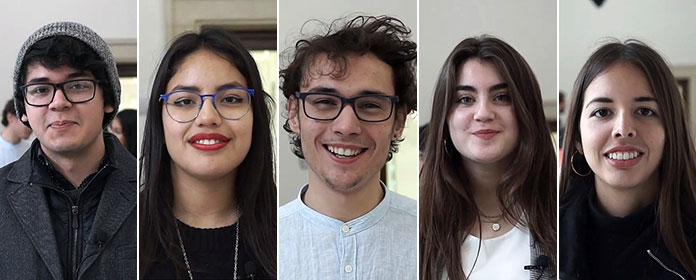20000310-"Los poetas y los niños son los grandes descubridores porque el mundo les sorprende continuamente"
"Poets and children are the great discoverers because the world continually surprises them."
Writer Romesh Gunesekera, at congress on the 'Vision of Childhood in Contemporary English Literature'.
Romesh Gunesekera, a Sri Lankan-born, English-educated writer, has spoken at the University of Navarra about childhood in literature. "We artists aspire to reflect the world with the freshness of a child's vision. Everything is new to them, regardless of whether things are good or bad. I think poets and children are the great discoverers because the world continually surprises them."
Gunesekera has participated in the "II congress of programs of study English and American " organized by the area of Modern Languages of the University of Navarra, with the partnership of the School of Philosophy and Letters and the Service of Cultural Activities Office and Social. The topic of this congress -which has been attended by experts from different European, Canadian and American universities- addresses 'Visions of childhood in contemporary literature in English'.
Romesh Gunesekera narrates many of his stories from the child's point of view. The writer has commented in his lecture some passages of his book 'El señor Salgado y el pastel de amor', recently published by Anagrama. In a statement, the writer expressed his interest in childhood: "When the child learns to speak, his world changes. And when the poet manages to master language, his vision of reality also changes".
A good book is the most subversive means of communicationThe writer recalled that great artists have sought to recover the simplicity and spontaneity of childhood: "Picasso, for example, said that when he was a child he used to draw like a child, and at the age of 75 he discovered that it had taken him a lifetime to draw like that again". He has also acknowledged the difficulties of writing from this perspective: "It is as difficult to get into the mind of a child as it is to get into the mind of any other person. Anyway, this exercise keeps me young".
"We all seek to name things in order to dominate them," he continued, "and that reaction is most acute in childhood. The finding of the world entails something magical. Magic arises because you don't know who controls the world. You contemplate that there is a power, but you don't know where it comes from". This feeling leaves people in middle age "because you think the world is run by Bill Gates and others.
Gunesekera has qualified that "we've all been through the childhood experience, so awakening the reader's childhood feelings is relatively easy. What's really difficult is telling the story from the perspective of a murderer if you've never been one yourself."
He also referred to the freedom of thought that literature allows: "Fiction literature allows you to discover that you are the owner of the things you think, that you write your own letters. Those who govern don't like fiction, because it reflects the world in a different way". Gunesekera concluded that "a good book is the most subversive means of communication because it tells you the great truths to your face".

